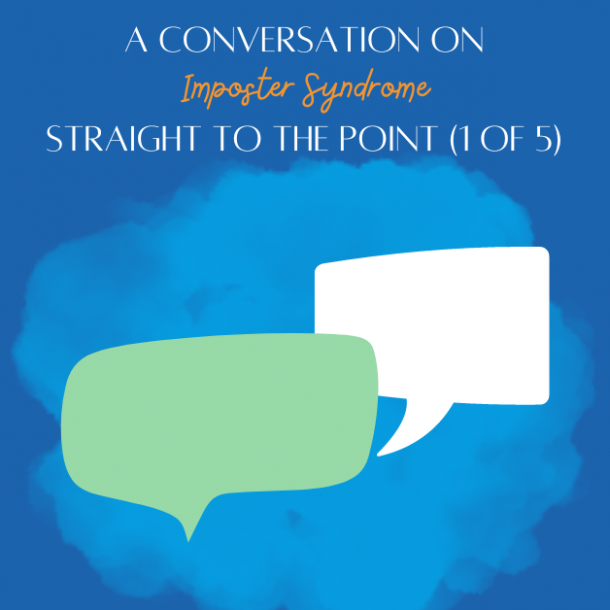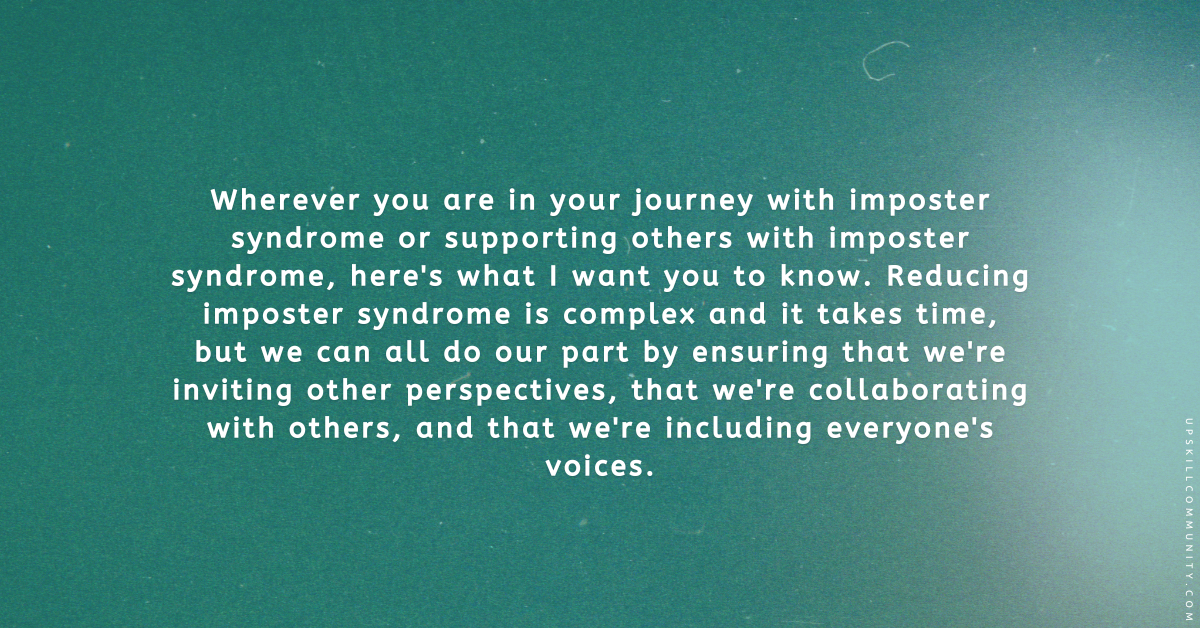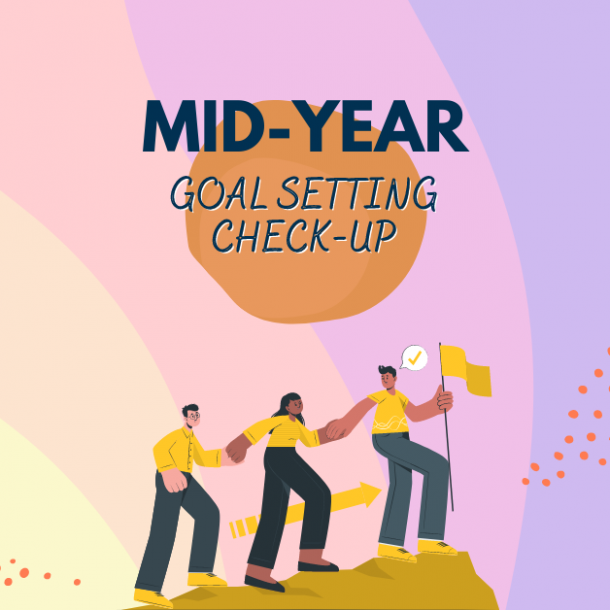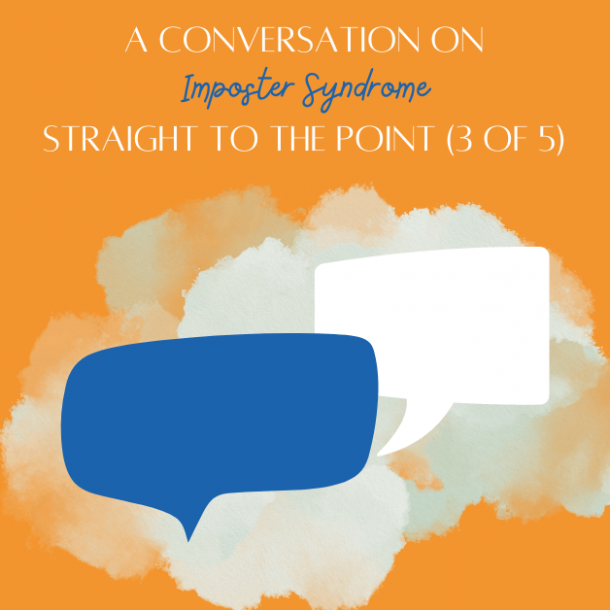
UpSkill: A conversation on imposter syndrome- Straight to the point (2 of 5)
In this blog post, we’re continuing the conversation on imposter syndrome. And we are looking at the role of deficit thinking, self-fulfilling prophecy, power and psychological safety on imposter syndrome.
The concept of psychological safety was developed by Amy Edmondson and describes people feeling safe to take the interpersonal risk of asking those “stupid questions” or bringing forth their ideas. And I think what we’ve highlighted is that in a number of the environments that we’re working in — whether it’s school, academically, or whether it’s professionally — that we’re lacking some of that. Either because of the structure that we’re working within, maybe the leaders that we’re working for, or maybe our own internal turmoil as a result of imposter syndrome is creating the conditions for it to perpetuate itself.
Cadeem had his own experience working in an environment with little psychological safety.
He was in a position for nine months (a series of three month contracts) that basically amplified his imposter syndrome.
He didn’t feel safe to ask stupid questions with my manager. So I didn’t feel safe to clear things up for myself. There was always a push to show more initiative, make his own decisions, but at the same time, there were also repercussions when he made the wrong decisions.
The repercussions could be maybe a half-hour discussion (filled mostly with criticism), followed up by an email with a few hundred words of more criticism.
This position was also a more senior role for Cadeem, so the constant criticism made Cadeem feel like he didn’t belong in that position.
In contrast, Cadeem received a lot of positive feedback in his first few weeks with his current position. The positive feedback included a senior executive saying “I think you’re gonna do great things with this company.” With a psychologically safe environment, Cadeem can make his own decisions and take initiative when need be. Then if mistakes happen he is also not criticized as harshly as he would have been with the previous role.
As I listened to Cadeem’s story, I also thought that the nature of the work (the three-month contracts) also adds to imposter syndrome. There is little stability and as an employee, you can feel like you’re on a hamster wheel.
For Tiffany, Cadeem’s story also stuck out to her due to the leadership. She knows that sometimes leaders center processes, rather than the people and the needs of the people.
Leadership could have looked at:
What are the things that we need to do to best support Cadeem to do a better job in the role that he’s in?
Instead, there is deficit thinking, where the focus is “What is he not doing?”
Perhaps if Cadeem’s manager had changed the approach, Cadeem would have been more comfortable stepping out his comfort zone and would have had more confidence.
Cadeem’s story also touched on how imposter syndrome is tied to the self-fulfilling prophecy.
A solid example of it comes from his second three-month contract. Cadeem was given more leeway to make decisions independently. The person who trained him in the first three months didn’t weigh in on the decisions he made about art, editing and so forth.
After the second contract though — going onto the last three months of the nine — the person who trained him was brought back in. That was a slap in the face to Cadeem. There was an understanding that he was basically demoted and that the decisions he made independently were not trusted.
His performance suffered in the last three months because he had that feeling of “what’s the point?” He felt like the writing was on the wall and had a feeling the next contract would be his last, which affected his focus and his performance.
For Peter, the idea of a performance appraisal inadvertently creates this aura of an imposter syndrome.
On the part of the audience, the employee, the meeting is often interpreted as more punitive than supportive. Managers will often downplay the areas where they can say “good job” to look for areas where “This can be improved upon.”
I believe this dynamic is present long before we enter the corporate world. We often do this as parents. Our child has gotten 75% or 80%, or 90%.
“Congratulations, that’s great! How come you missed this? What a silly mistake you made here!”
And then we go down that list of what is punitive. It’s almost as if we think that we can take for granted that you already know that 90% is good.
Maybe we can try to say “You know what? 90% is the goal we had. That’s perfect. Let’s move forward.”
We’re always looking for that opportunity, “How can we move this forward? How can we get ahead?”
As leaders we need to realize that we are also learners. It can be tough to do. It takes a lot of confidence. It challenges most of us as leaders.
You can be an expert, and an expert student.
But with power comes risk, and part of what feeds the imposter syndrome is the risk of standing up to power.
Power dynamics are an important part of how imposter syndrome is nurtured.
So how do we navigate power dynamics?
Power is politically incorrect to talk about, but there is no space that’s absent of power.
The thing that I want us to highlight is the very leaders who are creating the environment, that’s fostering imposter syndrome in others, are suffering from imposter syndrome too. So they bring it to the environment and they share it. And one of the things that the research suggests now in terms of where leaders are and where we need to be is that leadership has shifted from who we are. So being the leader is not just about your traits.
Before, you needed to be honest, you needed to be, attentive, you needed to be responsive to be a leader. And then we shifted to what you needed to do. You needed to do this to produce results. You needed to be able to do this.
Now we are at a higher order. Because the world has shifted, and this is why the stagnancy creates the imposter syndrome.
Leaders now have to create. Create a culture, a climate. We now have the responsibility to create a culture where people feel comfortable to ask stupid questions, where people know that you can make a mistake, you can trust your judgment. Because if you make a mistake, you are still in a psychological safe space. You’re not gonna lose your job. Your three-month contract isn’t going to be up and they won’t renew it.
Instead, it is safer to bring a particular performance, which you believe is required just for you to keep yourself afloat.

We can all make sure that the people around us feel valued and feel like they belong. And more than anything else, that they do not feel like imposters. We’ll continue this conversation in next week’s episode. Please join us again then.



